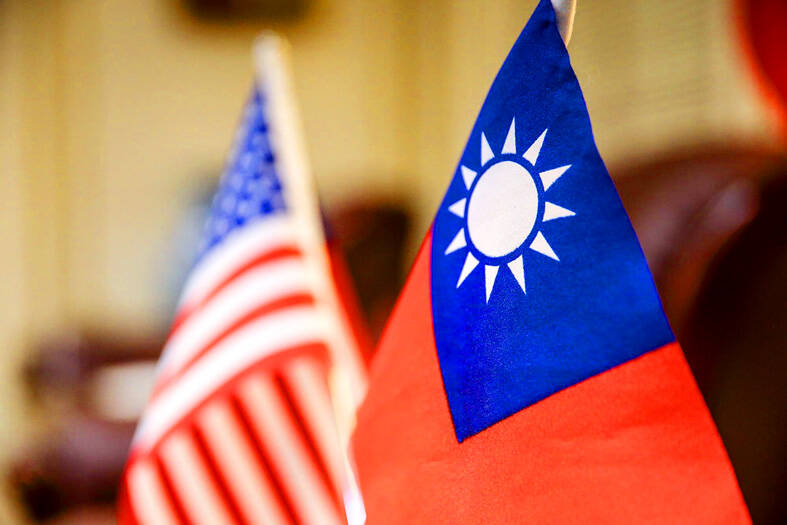Most Americans support Taiwan and favor improving Taiwan-US relations, a poll by the Virginia-based Humanity for Freedom Foundation found.
The poll, commissioned by Remington Research Group, found that 82 percent of respondents viewed Taiwan as an independent country, with 68 percent holding a positive view of Taiwan and 58 percent in support of formal diplomatic recognition by the US government.
The poll “highlights significant bipartisan agreement on key issues related to Taiwan’s sovereignty and its importance to the US,” the foundation said in a statement on Monday.

Photo: Cheng I-hwa Cheng, Bloomberg
Only 4 percent of respondents held a negative view of Taiwan, while 28 percent had no opinion, the poll showed.
About 3 percent said that Taiwan was a part of China, compared with 15 percent being unsure, it showed.
On the issue of diplomatic recognition, 5 percent were opposed to full diplomatic relations, while 37 percent were unsure, it showed.
On military defense, the responses were more mixed, with 39 percent believing that the US should continue to maintain strategic ambiguity on assisting Taiwan, while 32 percent believed that Washington should make its commitments clear.
About 27 percent were uncertain, while 3 percent believed the US should stop arm sales and make clear it would not defend the nation in the event of an invasion, the poll showed.
About 88 percent considered Taiwan important to the US, with 32 percent reporting that Taiwan is “very important,” the poll showed.
The results suggest “strong consensus” among the US public on Taiwan’s sovereignty and strategic importance to the US across party lines, age groups and other demographics, the statement said.
Calling the results a “clear message,” foundation president Dane Waters said that the US “must abandon the policy of strategic ambiguity and formally recognize Taiwan.”
“They are a democratic ally and a critical partner,” Waters added.
“Protecting Taiwan is not just a moral imperative, but also essential for US economic and national security interests,” foundation board member Paul Jacob said.
Remington Research Group conducted the nationwide survey from March 15 to 18, with 800 likely US voters as respondents.
The survey had a margin of error of 3.5 percentage points at a confidence level of 95 percent.
The foundation describes itself as a nonprofit organization committed to advancing freedom and democracy globally.
Additional reporting by CNA

MAKING WAVES: China’s maritime militia could become a nontraditional threat in war, clogging up shipping lanes to prevent US or Japanese intervention, a report said About 1,900 Chinese ships flying flags of convenience and fishing vessels that participated in China’s military exercises around Taiwan last month and in January last year have been listed for monitoring, Coast Guard Administration (CGA) Deputy Director-General Hsieh Ching-chin (謝慶欽) said yesterday. Following amendments to the Commercial Port Act (商港法) and the Law of Ships (船舶法) last month, the CGA can designate possible berthing areas or deny ports of call for vessels suspected of loitering around areas where undersea cables can be accessed, Oceans Affairs Council Minister Kuan Bi-ling (管碧玲) said. The list of suspected ships, originally 300, had risen to about

DAREDEVIL: Honnold said it had always been a dream of his to climb Taipei 101, while a Netflix producer said the skyscraper was ‘a real icon of this country’ US climber Alex Honnold yesterday took on Taiwan’s tallest building, becoming the first person to scale Taipei 101 without a rope, harness or safety net. Hundreds of spectators gathered at the base of the 101-story skyscraper to watch Honnold, 40, embark on his daredevil feat, which was also broadcast live on Netflix. Dressed in a red T-shirt and yellow custom-made climbing shoes, Honnold swiftly moved up the southeast face of the glass and steel building. At one point, he stepped onto a platform midway up to wave down at fans and onlookers who were taking photos. People watching from inside

Japan’s strategic alliance with the US would collapse if Tokyo were to turn away from a conflict in Taiwan, Japanese Prime Minister Sanae Takaichi said yesterday, but distanced herself from previous comments that suggested a possible military response in such an event. Takaichi expressed her latest views on a nationally broadcast TV program late on Monday, where an opposition party leader criticized her for igniting tensions with China with the earlier remarks. Ties between Japan and China have sunk to the worst level in years after Takaichi said in November that a hypothetical Chinese attack on Taiwan could bring about a Japanese

The WHO ignored early COVID-19 warnings from Taiwan, US Deputy Secretary of Health and Human Services Jim O’Neill said on Friday, as part of justification for Washington withdrawing from the global health body. US Secretary of State Marco Rubio on Thursday said that the US was pulling out of the UN agency, as it failed to fulfill its responsibilities during the COVID-19 pandemic. The WHO “ignored early COVID warnings from Taiwan in 2019 by pretending Taiwan did not exist, O’Neill wrote on X on Friday, Taiwan time. “It ignored rigorous science and promoted lockdowns.” The US will “continue international coordination on infectious